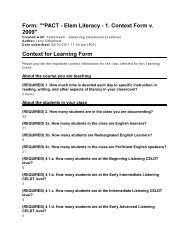The Tutoring Book - California State University, Sacramento
The Tutoring Book - California State University, Sacramento
The Tutoring Book - California State University, Sacramento
Create successful ePaper yourself
Turn your PDF publications into a flip-book with our unique Google optimized e-Paper software.
Response in the Multicultural Composition Classroom: Dissensus—A Dream (Deferred),” Carrie Shively<br />
Leverenz also explores this deficiency. She states that “although (early collaborative) pedagogy does<br />
give students practice in how to become members of established knowledge-making communities, it does<br />
not give them a mechanism for critiquing those communities” (2). How to teach this ability to question<br />
the institution in which one operates is keeping theorists everywhere awake at night. Luckily for us, as<br />
writing center tutors, we are inclined to encourage this kind of questioning, whether we mean to or not.<br />
Because of our ‘in-between’ role—not quite instructors, but not quite devoid of all authority—the<br />
collaborative environment we create will naturally be a place where standards and value systems are<br />
challenged. Collaboration at its roots encourages questioning because people share their systems of<br />
thought and in this transaction, thinking changes. We do not need to become experts in the disciplines of<br />
our tutees, but rather become experts in sharing and receiving knowledge, for in order for collaboration to<br />
really work, both parties must come to value the knowledge of the other. If one contributor is the expert<br />
in everything, it is not collaboration, just another classroom.<br />
Perhaps to answer our question of how exactly our tutors should be trained we should consider<br />
why we have a writing center at Sac <strong>State</strong> in the first place. In general, we think it is fairly safe to say that<br />
most of the tutors in our writing center are tutors because they feel that writing is an important process<br />
that students should learn, and believe that through discussing the process of writing with a peer, students<br />
can become better writers and more confident thinkers. Through approaching the concept of the writing<br />
center with respect for the discipline of writing and for the learning process of students, we should not<br />
feel the need to convert our center into a biology or history tutoring center. Providing an environment that<br />
values collaboration and shared experience and expects students to be responsible and active learners in<br />
their own writing process will encourage learning among both tutor and tutee in a way that allows both to<br />
succeed in and out of the institution.<br />
Works Cited<br />
Leverenz, Carrie Shively. “Peer Response in the Multicultural Composition Classroom: Dissensus—A<br />
Dream (Deferred).” Journal of Advanced Composition 14.1 (1994): 167- 86.<br />
Lunsford, Andrea. “Collaboration, Control, and the Idea of a Writing Center.” <strong>The</strong> St. Martin’s<br />
Sourcebook for Writing Tutors, 3 rd ed. Ed. Christina Murphy and Steve Sherwood. Boston: Bedford/St.<br />
Martin’s, 2008.<br />
McAndrew, Donald A. and Thomas J. Reigstad. <strong>Tutoring</strong> Writing: A Practical Guide for Conferences.<br />
Portsmouth, NH: Boynton/Cook, 2001.<br />
Moore Howard, Rebecca. "Collaborative Pedagogy." A Guide to Composition Pedagogies. Ed. Gary<br />
Tate, Amy Rupiper, and Kurt Schick. New York: Oxford UP, 2000. 54-70.<br />
130

















